#wizardry vii
Explore tagged Tumblr posts
Text

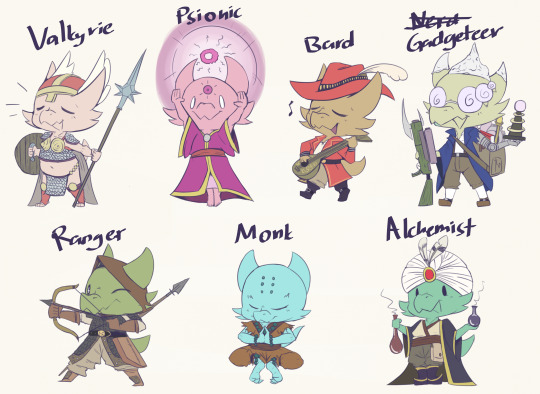
Wizardry 6-8 classes but Kobolds! Who would you bring to your party to the stars and into the Cosmic Circle?
#cute#fantasy#kobold#doodles#oc#wizardry 8#wizardry#bane of the cosmic forge#crusaders of the dark savant#rpg#dungeon crawler#scalie#wizardy vi#wizardry vii#wizardry 6#wizardry 7#wizardry viii#drpg#video games
243 notes
·
View notes
Text

Requested by @chambers-of-crimson-sleep
#Wizardry VII Crusaders of the Dark Savant#Wizardry Crusaders of the Dark Savant#Wizardry#Wizardry VII#wizardry 7#video games#gaming#video game polls#polls#tumblr polls#rpg
18 notes
·
View notes
Text
youtube
From Wizardry Gold - music by Jim Laurino
#wizardry gold#cd rom#intro#jim laurino#wizardry#wizardry vii#wizardry 7#crusaders of the dark savant#dungeon crawlers#fantasy#music#ost#games#game music#gaming#rpgs#crpgs#sir tech software#sir tech software inc#Youtube#intrain#theme#midi#1990s
0 notes
Text
Looking at my thousands of games I own, some bought brand new at $60+ and yet I sit here going "what if I played the worse translation for a VN I've recently finished?" Or "what if I play the English translation of a PS1 game that's the seventh in the series and I've played maybe two hours of one of them?" Or the most recent development: "hey what if I got a Sega Saturn emulator?"
What if I play a dating game I never knew existed until a youtube video mentioned it briefly?
Also I was surprised to learn that even fifteen years ago people used the console art for Higurashi. So it turns out the console art was available back on the PS2.
1 note
·
View note
Text
He chanted a song of wizardry, Of piercing, opening, of treachery, Revealing, uncovering, betraying. Then sudden Felagund there swaying sang in answer a song of staying, Resisting, battling against power, Of secrets kept, strength like a tower, And trust unbroken, freedom, escape; Of changing and of shifting shape, Of snares eluded, broken traps, The prison opening, the chain that snaps, Backwards and forwards swayed their song. Reeling and foundering, as ever more strong The chanting swelled, Felagund fought, And all the magic and might he brought, Of Elvenesse into his words. Softly in the gloom they heard the birds Singing afar in Nargothrond, The sighing of the sea beyond, Beyond the western world, on sand, On sand of pearls in Elvenland. Then the gloom gathered; darkness growing In Valinor, the red blood flowing Beside the sea, where the Noldor slew The Foamriders, and stealing drew Their white ships with their white sails From lamplit havens. The wind wails, The wolf howls. The ravens flee. The ice mutters in the mouths of the sea. The captives sad in Angband mourn, Thunder rumbles, the fires burn- And Finrod fell before the throne.
—Canto VII
#*mine#mona rambles#tolkien#silm#finrod felagund#sauron#the ley of leithian#this is literally just one of my favourite pieces of poetry and also just. my GUY#head in my hands head in my freaking hands
62 notes
·
View notes
Text
꧁𝐒𝐍𝐎𝐖 𝐎𝐍 𝐓𝐇𝐄 𝐁𝐄𝐀𝐂𝐇 (𝐰𝐞𝐢𝐫𝐝 𝐛𝐮𝐭 𝐟𝐮𝐜𝐤𝐢𝐧𝐠 𝐛𝐞𝐚𝐮𝐭𝐢𝐟𝐮𝐥)꧂ - 𝐌𝐀𝐒𝐓𝐄𝐑𝐋𝐈𝐒𝐓

Summary: In his life, Oliver Otto had only ever had one dream: to become successful, and, therefore, excessively rich. Well, maybe two dreams, but after his eleventh birthday had passed, and then his twelfth, and no owl with a letter inviting him to Hogwarts School of Witchraft and Wizardry had arrived on his window, he had given that one up. When Oliver moves to Westport, and gets invited to sit with the Cooper Bradford and his friends at lunch, he is ecstatic, because this is his chance. As time goes by, Oliver and Cooper grow up next to each other, with each other, and the older Oliver gets, the more confusing Cooper is to him, because Cooper makes him feel things that he isn’t familiar with. Little does he know, that Cooper has been this confused since he was thirteen years old.
Pairing: Cooper Bradford x Oliver Otto
Fandom: American Housewife (abc production)
Warnings: will be established for each chapter on its own
⋆ ࣪. ⁺⑅ ⋰˚ *.゚ .˳⁺⁎˚ ˚⁎⁺˳ . ༺ ˖࣪ ˖࣪ ∗
🤍teaser I. 🎧playlist. 🕯️ao3. ☁️wattpad.
chapter I | national anthem
chapter II | the best day
chapter III | million dollar man
chapter IV | it’s nice to have a friend
chapter V | season of the witch
chapter VI | you’re on your own kid (you can face this)
chapter VII | love (all about you)
chapter VIII | better than revenge
⋆ ࣪. ⁺⑅ ⋰˚ *.゚ .˳⁺⁎˚ ˚⁎⁺˳ . ༺ ˖࣪ ˖࣪ ∗
if you want to be added to the tag list, leave a comment or text me so I can add you! :)
#snow at the beach#yourmomxx#masterlist#taglist#fanfiction#mlm love#taylor swift#lana del rey#cooliver#oliver otto#cooper bradford#cooper bradford x oliver otto#american housewife#ao3fic#archive of our own#ao3 link#cooper x oliver#daniel dimaggio#logan pepper
124 notes
·
View notes
Text
Sony PlayStation - Wizardry 7 The Pearl of Guardia (Crusaders of the Dark Savant)
Title: Wizardry 7 The Pearl of Guardia / ウィザードリィVII ガーディアの宝珠
Developer: Sir-Tech Software / Soliton Soft / Locus Company
Publisher: Sony Computer Entertainment Inc. (Japan)
Release date: 13 October 1995
Catalogue No.: SCPS-10010
Genre: RPG
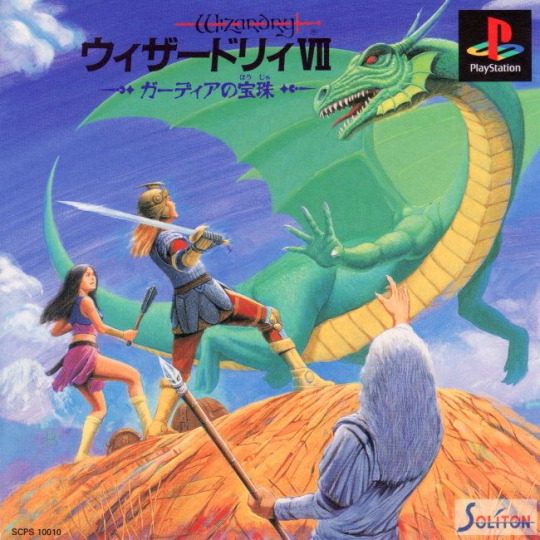
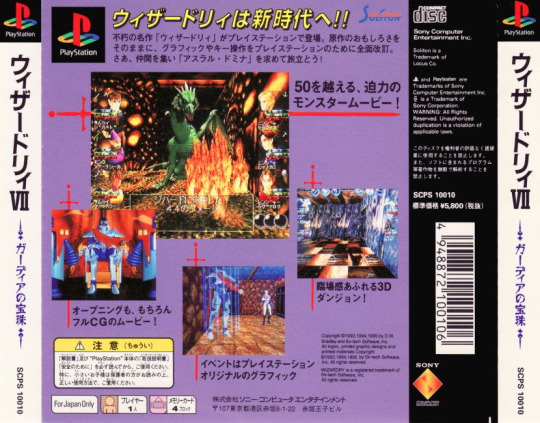
Wizardry 7 The Pearl of Guardia otherwise known as Crusaders of the Dark Savant on FM Towns, PC-9801, and MS-DOS, as well as the Sega Saturn as part of Wizardry 6 & 7 Complete is the seventh installment of the Wizardry series and a direct sequel to Bane of the Cosmic Forge (which saw a console port to the Super Famicom in the same year this PlayStation version of Wizardry 7 was released). At the end of the previous game, the party of heroes finally acquired the Cosmic Forge. However, before they were able to decide what to do with it, it was taken away by a servant of the Cosmic Lords, the cyborg Aletheides. It appears that the Cosmic Forge was in fact a clue to the location of the Astral Dominae, the artifact of life, somewhere on the planet Guardia, which has now been revealed to the universe.
The heroes then travel to Guardia, which is populated by many races and organizations with their own agendas, including the rhinoceros-like Imperial Umpani Federation and the spidery T'Rang affiliated with a malevolent being known as the Dark Savant, whose goal is to get rid of the Cosmic Lords. All these factions are looking for the Astral Dominae, finding which is the primary goal of the game. Depending on the decisions made by the player in the previous game (should he opt to import the party from there), the game will have different openings and begin in different locations. However, regardless of the initial premise, the player is free to follow or betray whatever faction he was supposed to be allied with.
I actually have to admit. It took me a while to get into Wizardry. I've always found Might and Magic games more varied and more dynamic, with their larger and much more open worlds, their flexibility, and user-friendliness (so far, I have played Might and Magic Gates to Another World and Isles of Terra. Might and Magic on PC Engine deserves mention though I hadn't played it). The first Wizardry I tried to tackle seriously was Bane of the Cosmic Forge, the Super Famicom version. I was fascinated by its character-building aspect but disappointed by the extreme monotony of its world and its linear progression. I also couldn't quite stomach the lack of an auto-map feature in a game known for its devilishly complex dungeons. I was therefore somewhat reluctant to play Wizardry 7. To my pleasant surprise, this game fixed everything that was, in my opinion, wrong with its predecessor, while retaining everything that made it great. It is a more generously designed game with a large world open for exploration, a less rigid progression, and new interesting features that come on top of an already excellent role-playing system.
The character creation can give you an idea of the game's depth and potential. I spent almost an hour rolling characters, trying to get that perfect combination of class, race, and attributes, to create the party, I really wanted. Without knowing the game inside out, however, it is rather impossible on the first try; that is why, somewhere in the middle of the game, I realized that I could have done some things differently and created a more powerful team. The discovery was a joyous one, because my party was perfectly capable of efficiently dispatching the foes, yet out of sheer curiosity and desire for experimentation I'd wanted to replay it before I finished it the first time. The game encourages trying out different combinations of classes and skills with your characters, increasing the replay value. And I barely even touched the excellent class-switching system, which allows you to create your own hybrids. Want to have a ninja who can hide in shadows, treacherously backstab, and critically hit enemies, and at the same time have at his disposal the entire spell arsenal of an experienced mage? With enough patience, persistence, and planning, you can do that.
Like its predecessor, Wizardry 7 is a beautifully challenging game - and, like it, the biggest challenge is simply exploring it. The entire game is built like an absolutely enormous, highly complex maze. There are two reasons why I enjoyed exploring it more than the comparable environment of Bane: non-linearity and automap. Unlike the previous game, Wizardry 7 doesn't put its areas in a specific order. Of course, some of the game's toughest and most coveted places are blocked off in the beginning due to a lack of certain skills and crucial items. Yet it is possible (especially during replays, when you already know where what is) to procure those items fairly quickly, gaining access to areas "out of order". In fact, you can march into the reasonably high-level Giants Cave almost right away - all you need is a high swimming skill, which you gain simply by swimming a lot. But even when you play the game for the first time, you are free to go to four or five large settlements and explore most of its dungeons in any order. This means that you feel much less "stuck" when you face a difficult puzzle - you can always go back and explore some other area, find a friendly person to trade with or get some information, hunt for better weapons or enemies that give more experience, and so on. The game keeps you occupied and interested regardless of what exactly you're doing.
The freedom of gameplay manifests itself also in the way the game handles encounters with its rather eccentric and well-written characters. You can choose to attack and kill anyone you meet in the game. This includes shop owners and crucial quest-givers. As long as you write down exactly what each character tells you, you can always finish the game, even if you literally kill everyone you meet. By the way, these characters are rather talkative and will provide quite a bit of information, enriching the game's lore - all given to you through an old-fashioned, yet strangely fulfilling text parser. They also tend to be memorable and funny. One of my favorites is the poetry-waxing Gorn King with his pseudo-philosophical musings. And who can forget the constantly inebriated brother T'Shober?..
A really interesting feature of the game is the NPC movement. Certain characters in the game don't just stand in one place, but wander around, searching for the exact same maps that you are searching for. These maps contain crucial information, and without them, it is impossible to finish the game (unless you're replaying it or consulting a walkthrough all the time). The thing is, these NPCs will sometimes get to those maps sooner than you. It will then become your priority to get the maps from them. This can be frustrating, but there are no dead ends in the game, and at any rate, it ensures that no playthrough is alike. Another notable feature is role-playing choices. You are free to join either the T'Rang or Umpani in their pursuit of the mysterious lost spaceship. Siding with one of those races will invariably incur the ire of the other, and one of the endings leads to a union with a certain faction. The different endings aren't easy to achieve and figure it - which, again, increases the replay value of the game.
On the downside, Wizardry 7 is tough. The battles, in fact, become more forgiving as the game advances, even if your character development is less than optimal - even simple straightforward leveling up gives you quite an edge. The game's difficulty lies in its puzzles, the clues to which are scattered all over the world and are really hard to find. Essentially, you'll have to explore each one of the game's large and complex dungeons to get the maps that give you crucial hints. However, some of those maps will likely have been snatched by your in-game adversaries, which means that you'll also have to find out who exactly has the map, track that person down, and either kill or bargain with him. Naturally, some people (me! me!) with little free time and even less patience can always use a walkthrough, bypassing much of the game's most cryptic and long-winded puzzle quests. Two maps, however, need to be found and used to complete the game.
Other difficulties and annoyances mostly lie in the game's somewhat user-unfriendly interface and archaic, hardcore gameplay elements such as the lack of teleportation spells. Luckily, some dungeons do provide reasonable shortcuts for quick post-exploration back-and-forth trekking, and enemy encounters lessen considerably when you backtrack on the same route.
Even though Wizardry 7 is a definite visual improvement over the previous game, it's still not very pretty, and quite monotonous. There is only one kind of tile for the cities, one for the wilderness (which consists entirely of forest), and two for the dungeons (castle and cave). More importantly, the wilderness feels somewhat too maze-like and too empty. Of course, you can always count on a treasure chest with a great weapon being hidden somewhere amid a thicket, and I suppose that's the reward for plowing through dozens and dozens of identical greenish squares, fighting sprite-sharing enemies on the way. Still, a little more variety would certainly make the game more appealing.
I am personally a bit mixed on what SCEI and Soliton have done to the portraits of enemies and NPCs in this PlayStation version. I know what they are going for, it was basically Sony flexing their 3D prowess (which was funnily enough inspired by Sony personnel seeing Virtua Fighter in the arcades), but to me, it just feels wrong somehow. I guess I am so used to the hand-drawn 2D portraits found on the FM Towns, PC-9801, MS-DOS, and Sega Saturn versions. Don't forget, the Sega Saturn version was ported by Data East and somehow Data East actually honored the good old days of 2D art in that version.
On a curious note, this must be the very first version of Wizardry 7 to actually feature some voice acting in it, though the voices are actually entirely in English (there are Japanese subtitles). If I remember, in 1996 there was a CD version of Wizardry 7 for MS-DOS PCs titled "Wizardry Gold". Somehow, Wizardry Gold is a little bit worse than this version of Wizardry 7 - it's buggier than the original Wizardry 7, features some questionable art design choices, and suffers from a bland, cumbersome Windows 95 interface. Also, Wizardry 7 for the PS1 does not support the mouse input, which feels bizarre considering Wizardry 6 and 7 were meant to be played with mouse input in mind.
In the end, Wizardry 7 is, for me, the first truly epic game in the series, one that broke boundaries and expanded beyond its scope, establishing itself as an essential classic RPG. It has everything that made its predecessors great, yet it takes risks and paves a path toward the future. With patience and persistence, this monster of a game can be tamed, and the reward far outweighs the frustration.
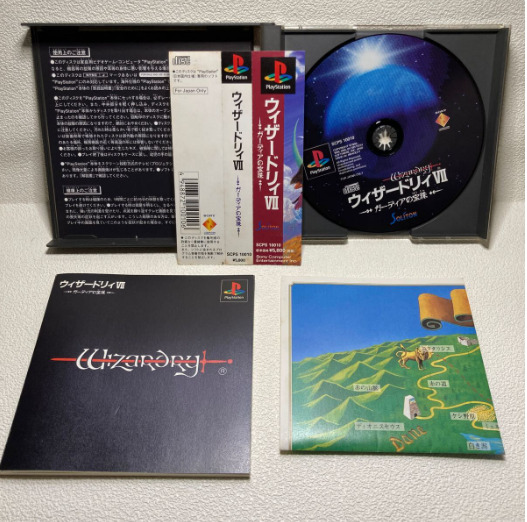
youtube
youtube
3 notes
·
View notes
Text
There Are No Words Adequate For This Day by pagination
Harry Potter crossover Time-travel fix-it 2 chapters (complete) 10k words
And then there was the other reason to hate this Halloween in particular.
“It’s curious that my old friend Xing chose to visit this Halloween, of all times,” Dumbledore told Severus privately, a month previous.
“No doubt he’s curious about the Boy-Who-Lived, like the rest of the idiot public,” Severus sneered.
“If it was anyone else, I might believe that. But he was never impressed by our troubles or interested in Harry. Or how he survived the Killing Curse. The Five Nations apparently have ways around it already. I’ve never been able to determine what.”
The practices of the cultivators—what the West incorrectly bundled under the infuriatingly inaccurate title “Battle Mages”—were a well-guarded mystery. They allegedly included immortality among them. Voldemort had sent several emissaries to the Yiling Patriarch in the hopes of stealing that infamous Dark Lord’s secrets. None of those well-bred, pure-blood emissaries had ever returned. In Severus’s opinion, this was no loss to the wizarding world.
He’d spent enough time wandering through the torturous paths of Dumbledore’s thinking, unfortunately, to know what the Headmaster was obliquely driving at. “The Yiling Patriarch would hardly reject all of the Dark Lord’s messengers and then decide to avenge him ten years later. There is no— no fraternity of Dark Lords.”
“The Yiling Patriarch is not the only one of the Seven Immortals,” Dumbledore reminded him gravely. “Simply the most powerful.”
By which Severus was meant to understand that the Light-bearing Lord, the greatest Light Lord history had ever known, might have some interest in the Potter spawn. Why? Was Dumbledore imagining his blasted prophecy child might be a threat to the Yiling Patriarch? The narrative of the six Immortals battling that great Dark Lord through millenia was, Severus knew through his correspondence with Five Nations compatriots, a story created and popularized by Western wizards who had Opinions about how magical alignment should behave. If he read between the lines correctly—and he was fairly certain he had—the eternal war between the Light-Bearing Lord and Yiling Patriarch involved more wrestling between bedsheets than spellfire exchanged across battlefields.
As we begin There Are No Words Adequate For This Day, Harry Potter is relieved to hear that news of members of the Five Nations visiting on Halloween overshadows his own notoriety. Halloween has meaning to more than one person at Hogwarts School of Witchcraft and Wizardry - this particular Halloween is Harry's first at Hogwarts, and events take a wide detour from the events of the first book in the series.
True, Hermione has run off and is not at the banquet. Also true, there are three members of the Immortal Five Nations attending, including the ICW ambassador from the Five Nations and a younger member who "dabbles" in Potions and is currently a lecturer and post-doctoral student at the Universität für Musik und darstellende Kunst by the name of Lan Yuan.
After a dark hole with "[t]hick, dangerous looking arms of black and burning red smoke" opens up in the dining hall, there is a fight against resentful not-lynx (ineffective on the part of the faculty, very effective from the "Battle Mages" who also appeared). And then, well, I'll leave you to enjoy the results, which are excellent.
Did I mention that Professor Quirrell arrives shouting something about a Troll?
The time-travel fixit comes into play because, well, those travelers who arrive through that dark hole are from the past. Follow-ups are explained in author's notes at the end of chapter 2.
Author pagination has read and enjoyed Author sami's ridiculous future bullshit series (reviewed here) and borrowed the Five Nations from that series. There are two other crossover stories in the series of tales by the author (Harry Potter x Final Fantasy VII, and Harry Potter x My Hero Academia).
4 notes
·
View notes
Note
tried to search for one of your posts to no avail. it lists rpgs you're significantly interested in or have played, with varying exclamation marks, under Keep reading. could you send the link to it if you can find it?
Unfortunately it would be pretty difficult to find for me as well but given that it's likely out of date I will take this opportunity to try making a new one (hopefully won't forget anything either). Thank you for this!
This time rather than symbols I will just list them all under more specific categories. Some of these are likely to change over time as I play more of the games (I have not finished all of them).
The list below also excludes browser games and MMORPGs. It's also likely to be incomplete.
RPGs that I have not played but am interested in and wish to at try at least for an hour or two
Oubliette.
Futurewar.
Avatar.
Beneath Apple Manor.
Dunjeonquest.
The Return of Heracles.
Phantasie.
Deathlord.
The Bard's Tale.
Starflight.
Alter Ego.
Wizardry IV.
Wizardry V.
Wizardry VI.
The Magic Candle.
Knights of Legend.
Dragon Wars.
The Dark Heart of Uurkrul.
Champions of Krynn.
Worlds of Ultima: The Savage Empire.
Fate: Gates of Dawn.
Disciples of Steel.
Gateway to the Savage Frontier.
Star Control 2.
Dark Sun: Shattered Lands.
Forgotten Realms: Unlimited Adventures.
Pool of Radiance.
Realmz.
Ravenloft: Stone Prophet.
Little Witch Nobeta.
Star Wars Knights of the Old Republic II: The Sith Lords.
Diablo.
Diablo 2.
Birthright: The Gorgon's Alliance.
Albion.
The Witcher 3.
Baldur's Gate 2.
Baldur's Gate 3.
Ogre Battle: The March of the Black Queen.
RPGs I have played just a little bit of, not enough for a full assessment
Ultima VI.
Ultima Underworld.
Worlds of Ultima: Martian Dreams.
Darklands.
Betrayal at Krondor.
Balrum.
NetHack.
Dungeon Master.
Dark Souls 3.
Bloodborne.
Fear & Hunger.
Library of Ruina.
Valkyria Chronicles.
Dragon's Dogma: Dark Arisen.
Arx Fatalis.
Dungeons of Dredmor.
Final Fantasy 7.
Jagged Alliance 2.
The Witcher 2.
Darkest Dungeon.
Wizards & Warriors.
Chinese Paladin.
Shadowrun Returns.
The Vale: Shadow of the Crown.
NieR: Automata.
Eschalon: Book 1.
Labyrinth of Touhou 2.
Luminous Arc.
Medabots - Metabee Version.
Wasteland.
Mass Effect 1.
RPGs I didn't enjoy that much (your opinion may be different though, and even I don't think all of these are entirely bad)
Ultima VIII.
Ultima IX.
Baldur's Gate 1.
Gothic 3.
Fallout 3.
Fallout 76.
Final Fantasy Tactics Advance.
Final Fantasy XIII.
Fallout 4.
RPGs I have played that were fine on the net (maybe even enjoyable) but which did not cause truly strong feelings
Path of Achra.
Legends of Amberland.
Queen's Wish: The Conqueror.
Avernum: Escape from the Pit.
Din's Curse.
The Elder Scrolls V: Skyrim (without mods).
UnReal World.
Final Fantasy 6.
Silent Storm.
The Elder Scrolls IV: Oblivion.
Deus Ex: Human Revolution.
System Shock 2.
Arcanum: Of Steamworks & Magick Obscura.
Might & Magic 6-8 (all played together on the 8th game's engine through a mod).
Caves of Lore.
Ultima ADOM: Caverns of Chaos.
Dark Messiah of Might & Magic.
Monster Hunter Tri.
Elminage Gothic.
Class of Heroes.
MegaMan Battle Network.
Legend of Grimrock.
Legend of Grimrock 2.
Tainted Grail.
Torchlight 2.
Wizardry I-II-III: Legacy of Llylgamyn.
Wasteland 2.
Sacred.
Warhammer 40k: Mechanicus.
Terraria.
Dragon Marked for Death.
Bravely Default.
Pokemon games in general (I actually prefer Touhoumon personally).
Evenicle.
Bishoujo Senshi Sailor Moon: Another Story.
Bloodstained: Ritual of the Night.
Castlevania: Order of Ecclesia.
Castlevania: Portrait of Ruin.
Dragon Age: Origins.
Mass Effect 2.
RPGs that would be so good if not for a couple of things (still usually worth it!)
Ultima IV.
Ultima V.
Ancient Domains of Mystery.
The Elder Scrolls II: Daggerfall.
Pathfinder: Kingmaker.
Erannorth Chronicles.
Kenshi.
Geneforge: Mutagen.
Caves of Qud.
Din's Legacy.
The Legend of Heroes: Trails of Cold Steel.
Loop Hero.
S.T.A.L.K.E.R.: Shadow of Chernobyl.
Wizardry VII.
The Elder Scrolls V: Skyrim (with mods).
Labyrinth of Refrain: Coven of Dusk.
Cataclysm: Dark Days Ahead.
Pillars of Eternity.
Deus Ex.
Disgaea DS.
Disgaea 2.
Disgaea 4.
La Pucelle: Tactics.
Soul Nomad & the World Eaters.
Fire Emblem: The Sacred Stones.
Fire Emblem: Path of Radiance.
Fire Emblem: Radiant Dawn.
Fire Emblem: Awakening.
Risen.
ELEX.
E.Y.E: Divine Cybermancy.
Mount & Blade: Warband.
Path of Exile.
Tyranny.
Temple of Elemental Evil.
Ashes 2063.
Wartales.
Demon's Souls.
Vampire: The Masquerade - Bloodlines.
Darkwood.
Odin Sphere.
RPGs that I strongly recommend, although they may still be VERY flawed, remember to look into them or ask further questions to see if they're for you
Tales of Maj'Eyal.
Ultima VII: The Black Gate.
Ultima VII: Serpent Isle.
Pathfinder: Wrath of the Righteous.
Dark Souls.
Elden Ring.
Code Vein.
Disco Elysium.
Divinity: Original Sin 2.
UnderRail.
Mary Skelter 2 + Remake.
Gothic.
Gothic 2.
Wizardry 8.
Princess Maker 2.
Fallout.
Fallout 2.
Fallout: New Vegas.
Chrono Trigger.
The Elder Scrolls III: Morrowind.
Planescape: Torment.
Tales of Berseria.
Etrian Odyssey IV.
Elona.
The Chronicles of Myrtana: Archolos.
Mount & Blade II: Bannerlord.
Pathologic 2.
Ar Tonelico: Melody of Elemia.
Slay the Spire.
10 notes
·
View notes
Video
youtube
Wizardry VII: Guardia no Houju (English Patched) - PSX
A 100% focused channel to promote unofficial translations And publicize hack ROMs. It will be one video per week. Please leave a like to help and comment.
Please consider donating to keep the lights on. Thanks. https://tinyurl.com/5ua9cttt
Description:
Wizardry VII: Guardia no Houju (ウィザードリィVII ガーディアの宝珠) is a RPG video game published by Locus, SCEI released on October 13th, 1995 for the PlayStation.
Released by: Gertius Language: English
Status: Complete
Patch Version: 1.0
Last updated: September 21, 2024
0 notes
Text
Sejarah Game RPG: Dari Dungeon hingga Dunia Terbuka
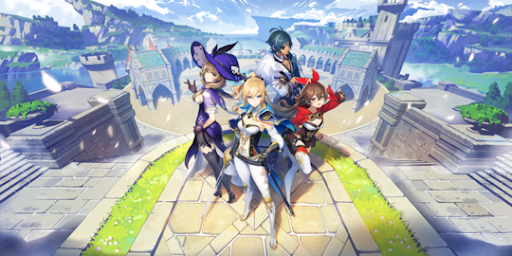
Game Role-Playing Game (RPG) telah menjadi salah satu genre paling populer dalam industri video game, menawarkan pengalaman mendalam dan narasi yang kaya. Sejarah RPG dimulai pada tahun 1970-an dengan permainan tabletop seperti Dungeons & Dragons (D&D), yang memperkenalkan konsep peran, narasi, dan dunia fantasi. D&D menginspirasi banyak pengembang untuk membawa elemen-elemen ini ke dalam format digital.
Game RPG pertama yang sukses secara komersial adalah Akallabeth: World of Doom (1982), sebuah game teks yang membiarkan pemain menjelajahi dungeon. Namun, terobosan besar terjadi dengan rilis Wizardry dan Ultima pada awal 1980-an, yang menambahkan elemen grafis dan petualangan yang lebih interaktif. Ultima khususnya, dikenal karena dunia terbuka yang luas dan kebebasan yang diberikan kepada pemain untuk mengeksplorasi.
Masuk ke era 16-bit pada tahun 1990-an, RPG mulai berkembang dengan hadirnya konsol seperti Super Nintendo. Game seperti Final Fantasy VI dan Chrono Trigger menghadirkan narasi yang mendalam, karakter yang kompleks, dan sistem pertarungan berbasis giliran. Ini menjadi titik awal bagi RPG Jepang yang mendominasi pasar, dengan karakter yang ikonik dan desain grafis yang menawan.
Seiring berjalannya waktu, RPG terus berevolusi. Kemunculan game 3D pada akhir 1990-an dan awal 2000-an, seperti The Elder Scrolls III: Morrowind dan Final Fantasy VII, membawa pengalaman bermain ke level baru dengan dunia terbuka yang lebih luas dan mendalam. Pemain tidak hanya bisa menjelajahi dunia yang kaya, tetapi juga berinteraksi dengan berbagai karakter dan menjalani cerita yang berbeda.
Hari ini, RPG modern, seperti The Witcher 3: Wild Hunt dan Genshin Impact, menggabungkan elemen dunia terbuka dengan gameplay yang dinamis dan narasi yang kompleks. Sejarah RPG menunjukkan bagaimana genre ini telah berkembang dari dungeon sederhana menjadi pengalaman mendalam yang mengajak pemain untuk merasakan petualangan yang tiada akhir.
0 notes
Note
Hold up, why do you like Final Fantasy? It seems opposite to Shin Megami Tensei. I guess you are an old guy, so maybe you were a fan of games like Wizardry and Ultima first, but that doesn't explain why you focus on the various regions of the world aspect instead of the kill things to get bigger stats and collect treasure.
Why do I like the incredibly popular Final Fantasy RPG series that has had significant reach in the video game space for 25+ years, especially with breakout titles like Final Fantasy VII and Final Fantasy X and more--all of which I've played until I've exhausted them of content, and all of them pretty much the genre standard definers for years outside of Japan before more than 5 people paid attention to Atlus products--most of which push the limits of technology and a given console, in addition to wide-appeal aesthetic elements and a catalog of music among the best in the industry?
It must be because I'm near death 👴
36 notes
·
View notes
Text
A Taxonomy of Magic
This is a purely and relentlessly thematic/Doylist set of categories.
The question is: What is the magic for, in this universe that was created to have magic?
Or, even better: What is nature of the fantasy that’s on display here?
Because it is, literally, fantasy. It’s pretty much always someone’s secret desire.
(NOTE: “Magic” here is being used to mean “usually actual magic that is coded as such, but also, like, psionics and superhero powers and other kinds of Weird Unnatural Stuff that has been embedded in a fictional world.”)
(NOTE: These categories often commingle and intersect. I am definitely not claiming that the boundaries between them are rigid.)
I. Magic as The Gun That Can Be Wielded Only By Nerds
Notable example: Dungeons & Dragons
Of all the magic-fantasies on offer, I think of this one as being the clearest and most distinctive. It’s a power fantasy, in a very direct sense. Specifically, it’s the fantasy that certain mental abilities or personality traits -- especially “raw intelligence” -- can translate directly into concrete power. Being magical gives you the wherewithal to hold your own in base-level interpersonal dominance struggles.
(D&D wizardry is “as a science nerd, I can use my brainpower to blast you in the face with lightning.” Similarly, sorcery is “as a colorful weirdo, I can use my force of personality to blast you in the face with lightning,” and warlockry is “as a goth/emo kid, I can use my raw power of alienation to blast you in the face with lightning.”)
You see this a lot in media centered on fighting, unsurprisingly, and it tends to focus on the combative applications and the pure destructive/coercive force of magic (even if magic is notionally capable of doing lots of different things). It often presents magic specifically as a parallel alternative to brawn-based fighting power. There’s often an unconscious/reflexive trope that the heights of magic look like “blowing things up real good” / “wizarding war.”
II. Magic as The Numinous Hidden Glory of the World
Notable examples: Harry Potter, The Chronicles of Narnia, H.P. Lovecraft’s Dream Cycle
The point of magic, in this formulation, is that it is special. It is intrinsically wondrous and marvelous. Interacting with it puts you in a heightened-state-of-existence. It is -- ultimately -- a metaphor for The Secret Unnameable Yearnings of Your Soul, the glorious jouissance that always seems just out of reach.
It doesn’t so much matter how the magic actually functions, or even what outcomes it produces. The important thing is what magic is, which is...magical.
This is how you get works that are all about magic but seem entirely disinterested in questions like “what can you achieve with magic?,” “how does the presence of magic change the world?,” etc. One of the major ways, anyway.
The Numinous Hidden Glory fantasy often revolves around an idea of the magic world, the other-place where everything is drenched in jouissance. [Sometimes the magic world is another plane of existence, sometimes it’s a hidden society within the “real world,” doesn’t matter.] The real point of magic, as it’s often presented, is being in that magic world; once you’re there, everything is awesome, even if the actual things you’re seeing and doing are ordinary-seeming or silly. A magic school is worlds better than a regular school, because it’s magic, even if it’s got exactly the same tedium of classes and social drama that you know from the real world.
Fantasies of this kind often feature a lot of lush memorable detail that doesn’t particularly cohere in any way. It all just adds to the magic-ness.
III. Magic as the Atavistic Anti-Civilizational Power
Notable examples: A Song of Ice and Fire, Godzilla
According to the terms of this fantasy, the point of magic is that it doesn’t make sense. It doesn’t make sense within the logic of civilized human thought, anyway. It is nature and chaos given concrete form; it is the thing that tears away at the systems that we, in our [Promethean nobility / overweening hubris], try to build.
There’s not a baked-in value judgment here. This kind of magic can be presented as good, bad, or some of both. Same with civilization, for that matter.
It’s often presented as Old Myths and Folkways that have More Truth and Power Than Seems Reasonable. Narratively, it often serves as a dramatized version of the failure of episteme, and of the kind of entropic decay that in real life can take centuries to devour empires and ideologies.
This kind of magic is almost always the province of savages, actual inhuman monsters, or (occasionally) the very downtrodden.
(I think it is enormously telling that in A Song of Ice and Fire -- a series that is jammed full of exotic cults and ancient half-forgotten peoples, all of whom have magic that seems to work and beliefs that at least touch on mysterious truths -- only the Westerosi version of High Medieval Catholicism, the religion to which most of the people we see notionally adhere, is actually just a pack of empty lies.)
IV. Magic as an Overstuffed Toybox
Notable examples: Naruto, JoJo’s Bizarre Adventure
Or, sometimes, we care about what magic actually does. More than that -- sometimes we want to see magic doing really interesting things, and then other magic intersecting with it in ways that are even more interesting.
The fantasy here, in simplest terms, is “magic can achieve any arbitrary cool effect.” There doesn’t tend to be an overarching system that explains how it’s all supposed to come together, or if there is, it tends to be kind of lame and hand-wavey -- a rigorous system of Magic Physics, delineating the limits of the possible, would get in the way of all the cool effects we want to show!
Once again, this shows up a lot in combat-heavy narratives. Less with the genericized D&D-style “magic is a fist that can punch harder than your regular meat fist,” and more with people throwing weird and wacky powers at each other in order to show how those powers can be used creatively to overcome opposition. Sometimes, instead of combat, you get magicians using their cool-effects magic to MacGuyver their way out of problems or even trying to resolve large-scale social problems. Issues of magic usage within the narrative being “fair” or “unfair” or “cheesy” are important here in ways that they generally aren’t elsewhere, since the fantasy on offer comes close to being a game.
(Ratfic often falls into this category.)
V. Magic as Alternate-Universe Science
Notable examples: the Cosmere books
This covers most of what gets called “hard fantasy.” The fantasy on offer is a pretty straightforward one -- “magic has actual rules, you can learn them, and once you’ve learned them you can make predictions and achieve outcomes.” It’s puzzle-y in the way that the previous fantasy was game-y. It’s often a superstimulus for the feeling of learning a system in the way that video game grinding is a superstimulus for the feeling of rewarding labor.
The magic effects on offer tend to be less ridiculous and “broken” than toybox magic, because any logic you can use to achieve a ridiculous effect is going to influence the rest of the magic system, and special cases that aren’t grounded in sufficiently-compelling logic will ruin the fantasy.
Not super common.
VI. Magic as Psychology-Made-Real
Notable examples: Revolutionary Girl Utena, Persona
This kind of magic makes explicit, and diagetic, what is implicit and metatextual in most fantasy settings. The magic is an outgrowth of thought, emotion, and belief. Things have power in the world because they have power in your head. The things that seem real in the deepest darkest parts of your mind are actually real.
This is where you get inner demons manifested as actual demons (servile or hostile or anything in between), swords forged from literal hope, dungeons and labyrinths custom-tailored to reflect someone’s trauma, etc.
The fantasy, of course, is that your inner drama matters.
My personal favorite.
VII. Magic as Pure Window Dressing
Notable examples: later Final Fantasy games, Warhammer 40K
This one is weird; it doesn’t really make sense on its own, only metatextually. I think of its prevalence as an indicator of the extent to which fantasy has become a cultural staple.
The fantasy on offer in these works is that you are in a fantasy world that is filled with fantasy tropes. And that’s it.
Because the important thing here is that the magic doesn’t really do anything at all, or at least, it doesn’t do anything that non-magic can’t do equally well. It doesn’t even serve as an indication that Things are Special, because as presented in-setting, magic isn’t Special. Being a wizard is just a job, like being a baker or a tailor or something -- or, usually, like being a soldier, because the magic on offer is usually a very-simple kind of combat magic. And unlike in D&D, it’s not like magic is used only or chiefly by a particularly noteworthy kind of person. It’s just...there.
The great stories of the world, in these works, don’t tend to feature magic as anything more than a minor element. The point is to reassure the audience that this is the kind of world, the kind of story, that has magic.
-------------------------------------------------
Thoughts? Critiques? Other categories to suggest?
694 notes
·
View notes
Text
Sega Saturn - Wizardry 6 & 7 Complete
Title: Wizardry 6 & 7 Complete / ウィザードリィ VI & VII コンプリート
Developer/Publisher: Sir-Tech Software / Data East
Release date: 31 May 1996
Catalogue No.: T-1306G
Genre: Compilation / RPG
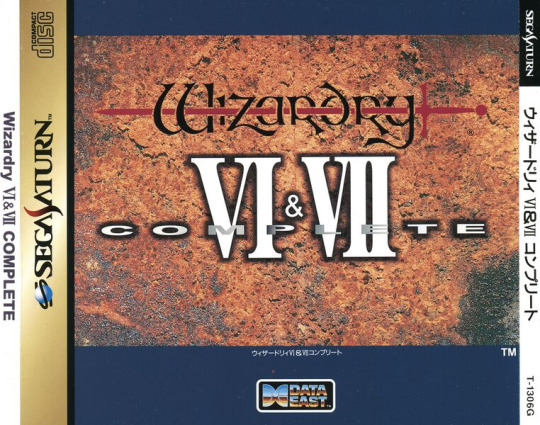
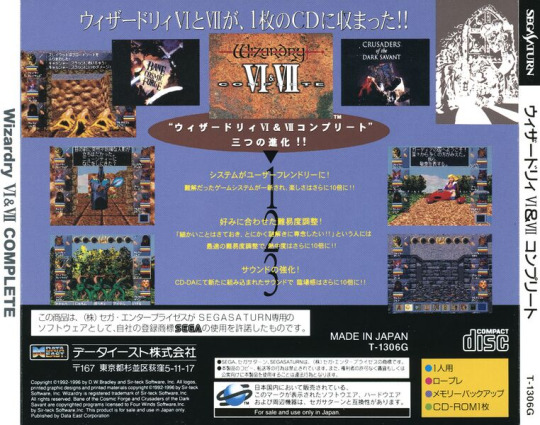
Unlike Wizardry Llylgamyn Saga (I will get to that game later), this game has no English option at all, so you have to put up with it being in Japanese. Add the fact that this game looks uglier than the other one also makes buying it a tough decision. To be honest this isn't bad if you're into the Wizardry games but if you're not and are looking in to starting them on your Saturn, then I suggest getting Wizardry Llylgamyn Saga first.
Fun fact: According to Sega FY 1997, a North American release appears to have been planned at one stage for November 1996, but it didn't end up happening as far as I know. As a result, all the Wizardry games the Saturn ended up getting, stayed in Japan - even the port of Wizardry Nemesis.
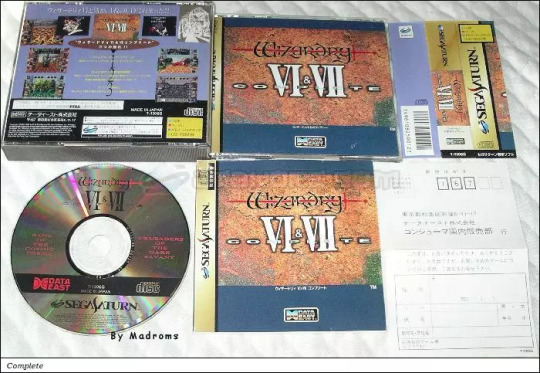
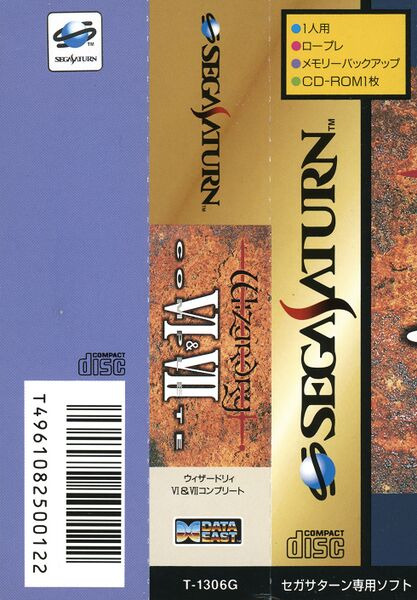
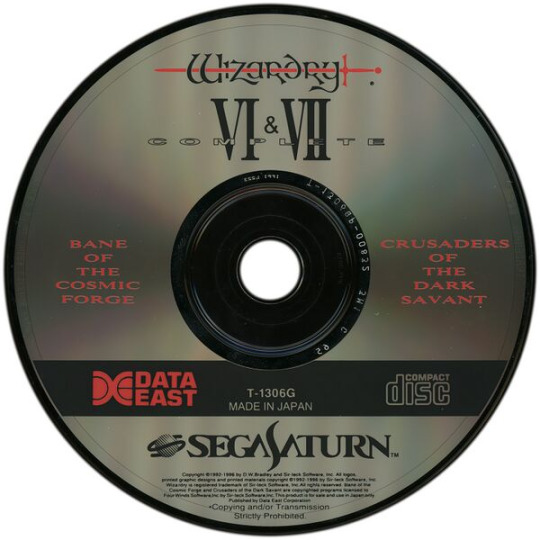
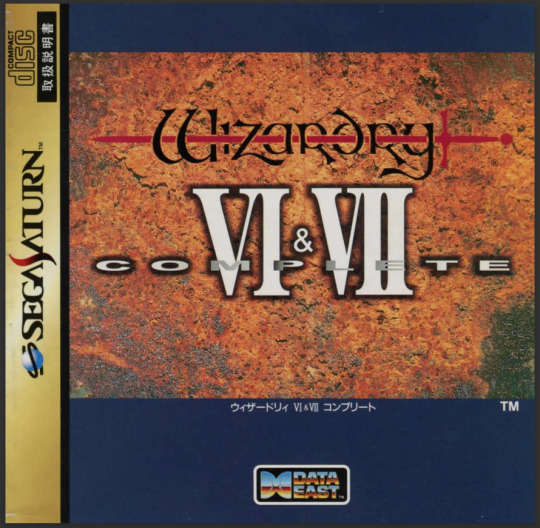
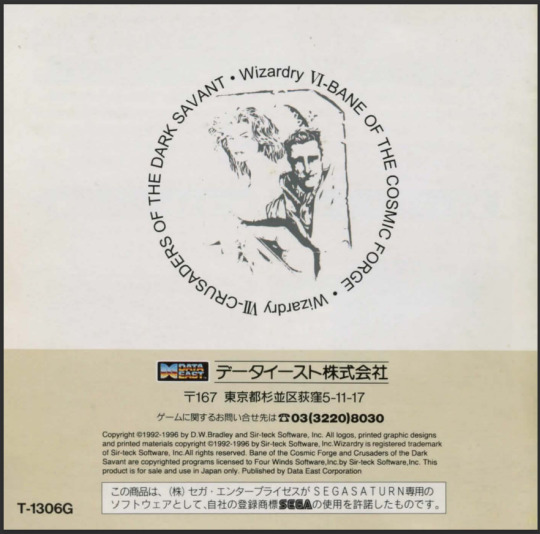
youtube
1 note
·
View note
Text
Got a bit burnt out on the classic party based RPGs of my youth (Might & Magic VII, Wizardry 8) so decided to try a more modern one. Playing Operencia: The Stolen Sun and it’s pretty neat so far. Not much in the way of character classes & customisation which is a shame, you make one character from one of three classes which means there’s not all that much discovery to be had compared to something like Wizardry 8 with its... fifteen? classes. Still the setting is neat, the sense of humour is fun, the puzzles aren’t too moon logic obtuse. The crafting is a one-and-done logic puzzle for each new potion recipe you find which is kind of a cool idea.
But I really do question the judgement of the first companion you meet having a whole skill tree dedicated to poison damage when I am four hours in and almost without exception the enemies I have fought have been poison resistant or completely immune to poison.
6 notes
·
View notes
Text
CRPG Progress 2023
I just thought I’d write myself a list of games from the highly-recommended and free CRPG book I sometimes mention.
There is still a lot of stuff from that book that I want to play, as well as other games not mentioned in it.
Ideally I would play at least a little bit of everything on it for the best historical perspective, but in practice I find it difficult enough to finish just my existing backlog so I need to prioritize some things over others.
If a game is marked with a single exclamation mark, it means it sounds particularly interesting to me even beyond its historical significance and I want to try it for at least a couple of hours to see what it’s like.
If a game is marked with two exclamation marks, it means I have played some of it.
If a game is marked with three exclamation marks, it means I have played enough of it to have a reasonably solid idea of how it plays and all.
If a game is marked with four exclamation marks, it means I have reached the end credits or otherwise finished the game at least once.
70s RPGs
Beneath Apple Manor (!)
Dunjonquest: Temple of Apshai (!)
Oubliette (!)
Futurewar (!)
Avatar (!)
80s RPGs
The Return of Heracles (!)
Wizard’s Crown (!)
Phantasie (!)
Starflight (!)
Alter Ego (!)
Deathlord (!)
Wizardry II: The Knight of Diamonds (!)
Wizardry IV: The Return of Werdna (!)
Pool of Radiance (!)
Wizardry V: Heart of the Maelstrom (!)
The Magic Candle (!)
The Dark Heart pf Uurkrul (!)
Knights of Legend (!)
Dungeon Master (!!)
NetHack (!!)
Wasteland (!!)
Wizardry III: Legacy of Llylgamyn (!!!)
Wizardry: Proving Grounds of the Mad Overlord (!!!!)
Ultima IV: Quest of the Avatar (!!!!)
Ultima V: Warriors of Destiny (!!!!)
90s RPGs
Ultima VI: The False Prophet (!)
Wizardry VI: Bane of the Cosmic Forge (!)
Captive (!)
Champions of Krynn (!)
Fate: Gates of Dawn (!)
Disciples of Steel (!)
Worlds of Ultima: Martian Dreams (!)
Star Control 2 (!)
Betrayal at Krondor (!)
Dark Sun: Shattered Lands (!)
Forgotten Realms: Unlimited Adventures (!)
Ravenloft: Stone Prophet (!)
Birthright: The Gorgon’s Alliance (!)
Diablo (!)
Final Fantasy VII (!)
Might and Magic VI: The Mandate of Heaven (!)
Jagged Alliance 2 (!)
Might and Magic VII: For Blood and Honor (!)
Darklands (!!)
Ultima Underworld: The Stygian Abyss (!!)
UnReal World (!!)
Wizardry VII: Crusaders of the Dark Savant (!!)
Ultima VIII: Pagan (!!)
System Shock 2 (!!)
Baldur’s Gate (!!!)
Ancient Domains of Mystery (!!!)
The Elder Scrolls II: Daggerfall (!!!)
Ultima VII: The Black Gate (!!!!)
Princess Maker 2 (!!!!)
Exile Avernum: Escape From the Pit (!!!!)
Fallout (!!!!)
Fallout 2 (!!!!)
Planescape: Torment (!!!!)
Ultima IX: Ascension (!!!! DO NOT DO THIS PLEASE LEARN FROM MY MISTAKE)
2000s RPGs
Baldur’s Gate II: Shadows of Amn (!)
Might and Magic VIII: Day of the Destroyer (!)
Diablo 2 (!)
Wizards & Warriors (!)
ZanZarah: The Hidden Portal (!)
Neverwinter Nights (!)
Neverwinter Nights 2 (!)
The Legend of Heroes: Trails in the Sky (!)
Star Wars: Knights of the Old Republic II: The Sith Lords (!)
S.T.A.L.K.E.R: Shadow of Chernobyl (!)
The Witcher (!)
Yumina the Ethereal (!)
Eschalon: Book I (!!)
Arx Fatalis (!!)
The Battle for Wesnoth (!!)
Space Station 13 (!!)
Dark Messiah of Might and Magic (!!)
Mass Effect (!!)
Valkyria Chronicles (!!)
Dragon Age: Origins (!!)
Agarest: Generations of War (!!!)
Recettear: An Item Shop’s Tale (!!!)
Dwarf Fortress (!!!)
The Elder Scrolls III: Morrowind (!!!)
The Elder Scrolls IV: Oblivion (!!!)
Arcanum: Of Steamworks & Magick Obscura (!!!)
Elona (!!!)
Risen (!!!)
Deus Ex (!!!!)
Wizardry 8 (!!!!)
Gothic (!!!!)
Geneforge (!!!!)
Gothic 2 (!!!!)
Temple of Elemental Evil (!!!!)
Sacred (!!!!)
Vampire: The Masquerade - Bloodlines (!!!!)
Gothic 3 (!!!!)
Fallout 3 (!!!!)
Warhammer 40,000: Dawn of War II (!!!!)
2010s RPGs
Caves of Qud (!)
Dungeons of Dredmor (!)
Divinity: Original Sin (!)
Transistor (!)
The Witcher 3: Wild Hunt (!)
Tale of Wuxia (!)
Pyre (!)
Cultist Simulator (!)
Kingdom Come: Deliverance (!)
NEO Scavenger (!!)
The Age of Decadence (!!)
The Witcher 2: Assassin of Kings (!!)
Legend of Grimrock 2 (!!)
Shadowrun Returns (!!)
Dragon’s Dogma (!!)
Cataclysm: Dark Days Ahead (!!)
Pillars of Eternity (!!)
Darkest Dungeon (!!)
NieR: Automata (!!)
Kenshi (!!)
Vampyr (!!)
E.Y.E: Divine Cybermancy (!!!)
Mount & Blade: Warband (!!!)
Torchlight 2 (!!!)
Din’s Curse (!!!)
The Elder Scrolls V: Skyrim (!!!)
Divinity: Original Sin 2 (!!!)
Wasteland 2 (!!!)
UnderRail (!!!)
Fallout 4 (!!!)
Fallout: New Vegas (!!!!)
Mass Effect 2 (!!!!)
Dark Souls (!!!!)
Magical Diary (!!!!)
Deus Ex: Human Revolution (!!!!)
Tales of Maj’Eyal (!!!!)
Legend of Grimrock (!!!!)
Path of Exile (!!!!)
Tyranny (!!!!)
ELEX (!!!!)
Pathfinder: Kingmaker (!!!!)
Slay the Spire (!!!!)
Disco Elysium (!!!!)
7 notes
·
View notes